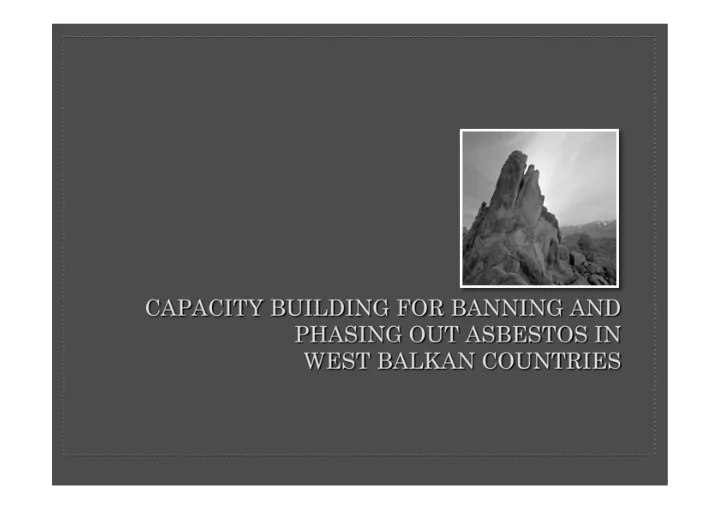

Asbestos is a fibrous mineral that has been used in Europe as electrical and heat insulation, reinforcing concrete and polymers, sound insulation etc. Altogether, more than 3000 products are known to contain asbestos. Largely 'thanks' to ease of mining, it is also a very cheap material. Given all its good and useful qualities, it has one major drawback - asbestos is declared a type A1 carcinogen, which is to say - it definitely causes cancer in humans.
Asbestos is dangerous when it is dispersed into the air as very small fibres that are invisible to the naked eye. Breathing in those asbestos fibres can lead to one of three diseases: * Asbestosis, a scarring of lung tissue; * Lung cancer; * Mesothelioma, a cancer of the pleura (the smooth lubricated double membrane sacs containing the lungs) or of the peritoneum (the smooth double membrane lining the inside of the abdominal cavity). Asbestosis severely hinders breathing and can be a contributory cause of death. Lung cancer is fatal in about 95% of cases. Lung cancer can also follow in cases of asbestosis. Mesothelioma is not curable, and usually leads to death within 12 to 18 months of diagnosis
Asbestos is banned in European Union (in all 27 countries). There is EU Asbestos Directive which ban usage of asbestos . Also, there are ongoing extensive supporting measures for phasing out asbestos in EU member countries. Special attention and measures are devoted to asbestos removal and disposal. In West Balkan Countries only in Croatia (almost) banned asbestos. There are very limited actions and support measures for phasing out asbestos in these countries. Also, almost no or very limited attention and measures are devoted to asbestos removal and disposal.
Thus they should implement European Directives in their national legislation. Among others Asbestos Directive too. And they should have already done. It is not just legal EU requirement – it could be significant positive step toward better Occupational Safety and Health in these countries.
Civil Society Organizations - also known as non-governmental organizations - are critical actors in the advancement of universal values around human rights, the environment, labour standards, anti-corruption, etc. As global market integration has advanced, their role has gained particular importance in aligning economic activities with social and environmental priorities.
The overall objective of this project is to strengthen capacity of Civil Society Organizations from West Balkan Countries to be able to deal with asbestos issue at these countries.
to create partnership between Civil Society Organizations from the • � West Balkan Countries interested in dealing with asbestos issue, and partnership with similar organizations from European Union, to transfer a know-how from EU member countries (especially new • � member countries) about their experience in dealing with asbestos issue (procedures, measures, activities, challenges, problems, etc.), to increase public awareness about presence of asbestos containing • � materials and hazards to humans' health what they can cause, to lobby at decision makers for prompt adopting and implementation of • � EU Asbestos Directive in national legislatives of West Balkan Countries,
• � Civil Society Organizations (professional and business associations, NGO’s, etc.) dealing with occupational health and safety, as well as environmental issues. • � National and Local Authorities. • � Occupational Health and Safety workers and inspectors. • � Industrial companies and SMEs where asbestos is used.
Final beneficiaries are persons exposed to risks of asbestos containing materials (workers in companies where asbestos is used, workers in waste disposal companies, employees and children working/studying in buildings containing asbestos materials, inhabitants in homes containing asbestos materials, etc.) – i.e. ALMOST ALL OF US
• � Preparation of a study for the current situation with asbestos in the West Balkan Countries. • � Organization of Balkan conference about problems with asbestos. • � Development of partnership network among interested organizations from West Balkan countries, and with EU member countries. • � Campaign for increasing public awareness about problem with asbestos. • � Development of Action plan for implementation of EU Directive about asbestos. • � Lobbying at relevant authorities for adoption and implementation of EU Asbestos Directive in national legislatives of West Balkan Countries. • � Training seminar for occupational health and safety specialists and inspectors in identifying asbestos risks, as well as organizing and carrying out works on asbestos-containing hazardous substances including asbestos-cement products. • � Preparation and publishing educational materials about asbestos and his hazardous influence on the humans’ health, as well as about working with materials containing asbestos. • � Management of the project
• � Networking of the Civil Society Organizations from the West Balkan Countries interested in dealing with asbestos issue, and their partnership with similar organizations from EU. • � Defining the depth of the problem with asbestos at West Balkan Countries. • � Preparation of an Action plan for implementation of measures and activities for dealing with the problem with asbestos at West Balkan Countries. • � Increasing public awareness about problem with asbestos. • � Adoption and implementation of the European Asbestos Directive in national legislatives of West Balkan Countries. • � Training of occupational health and safety specialists and inspectors in identifying asbestos risks and organizing and carrying out works on asbestos- containing hazardous substances including asbestos-cement products. • � Publishing public domain educational resources (in WBC languages) about asbestos and its hazard impact on the humans’ health, as well as about working with materials containing asbestos
Gauss Institute - Bitola ARC Fund - Sofia Heliks - Belgrade EKOPOT – Tuzla
Recommend
More recommend